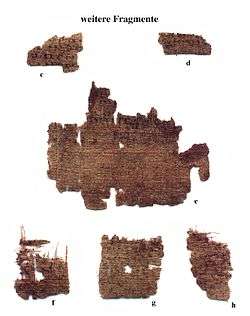Romans 3
| Romans 3 | |
|---|---|
|
Fragment c to h containing parts of the Epistle to the Romans in Papyrus 40, written about AD 250. | |
| Book | Epistle to the Romans |
| Bible part | New Testament |
| Order in the Bible part | 6 |
| Category | Pauline epistles |
Romans 3 is the third chapter of the Epistle to the Romans in the New Testament. It is authored by Paul the Apostle, but written by an amanuensis, Tertius, while Paul was in Corinth, in winter of AD 57-58.[1] Paul wrote to the Roman Christians in order to give them a substantial resume of his theology.[2]
In this chapter, Paul asks a series of rhetorical questions in order to develop his theological message,[3] and quotes extensively from the Hebrew Bible.[4] Theologian Albert Barnes suggests that "the design of the first part of this chapter is to answer some of the objections which might be offered by a Jew to the statements in the last chapter".[5]
Text
- The original text is written in Koine Greek.
- Some most ancient manuscripts containing this chapter are:
- Papyrus 40 (ca. AD 250; extant: 21-31)
- Codex Vaticanus (AD 325-350)
- Codex Sinaiticus (AD 330-360)
- Codex Alexandrinus (ca. AD 400-440)
- Codex Ephraemi Rescriptus (ca. AD 450; extant: verses 22-31)
- This chapter is divided into 31 verses.
Structure
The New King James Version organises this chapter as follows:
- Romans 3:1-8 = God’s Judgment Defended
- Romans 3:9-20 = All Have Sinned
- Romans 3:21-26 = God’s Righteousness Through Faith
- Romans 3:27-31 = Boasting Excluded
The New International Version refers to Romans 3:1-8 as God's Faithfulness.
Theologian Heinrich Meyer argues that chapter 4 should have begun with Romans 3:31 "since that verse contains the theme of the following discussion".[6]
Cross references
- Romans 3:4 = Psalm 51:4
- Romans 3:12 = Psalm 14:1–3; Psalm 53:1–3; Ecclesiastes 7:20
- Romans 3:13 = Psalm 5:9; Psalm 140:3
- Romans 3:14 = Psalm 10:7
- Romans 3:17 = Isaiah 59:7-8
- Romans 3:18 = Psalm 36:1
The Oracles of God
The chief advantage, or benefit, or responsibility, or superiority [7] of the Jewish people is their possession of the Hebrew Bible (Greek: τα λογια του θεου, ta logia tou theou, "the very words of God").[8] Traditional translations (the Geneva Bible, King James Version and American Standard Version) refer to the "oracles of God". The Jewish "advantage" (Greek: το περισσον, to perissov) is really an act of entrustment:
- The Jews have been entrusted with the very words of God (Romans 3:2 NIV).
Nonconformist theologian Matthew Poole stated that "to the Jews were credited, or given in custody, the Holy Scriptures". Stephen, whose martyrdom Paul had witnessed before his conversion, called the scriptures the "living oracles" (Greek: λογια ζωντα, logia zonta).[9]
Slanderous criticisms
In verse 8, Paul refers to slanderous accusations made by "some people" [10] that believers say “Let’s do evil that good may result”.
Bishop Charles Ellicott suggests that these accusers might have been the Jews or "the Judaizing party";[11] Barnes says it is "doubtless" that they were Jews;[12] the Cambridge Bible for Schools and Colleges argues that they were Paul's "inveterate adversaries in the Church".[13]
Verse 23
- For all have sinned and fall short of the glory of God.[14]
Justification by faith - a conclusion (verse 28)
- Therefore we conclude (Greek: λογιζόμεθα, logizometha) that a man is justified by faith apart from the deeds of the law.[15]
The verb logizometha is plural:[16] "we conclude" in the King James Version and New King James Version, "as we see it" in the Jerusalem Bible", "we maintain" in the New American Standard Version, "we reason" or "we maintain" in the Cambridge Bible for Schools and Colleges, arbitramur in the Vulgate. Bishop Charles Ellicott considers that we conclude "conveys too much the idea of an inference; the statement is rather made in the form of an assertion, we consider or we hold" [17] whereas theologian John Gill does treat the phrase as a "conclusion from the premises".[18]
See also
- Torah
- Other related Bible parts: Psalm 5, Psalm 10, Psalm 14, Psalm 36, Psalm 51, Psalm 53, Psalm 140, Ecclesiastes 7, Isaiah 59
References
- ↑ Halley, Henry H. Halley's Bible Handbook: an Abbreviated Bible Commentary. 23rd edition. Zondervan Publishing House. 1962.
- ↑ Holman Illustrated Bible Handbook. Holman Bible Publishers, Nashville, Tennessee. 2012.
- ↑ There are 15 rhetorical questions according to the New International Version translation
- ↑ There are 9 biblical references: see Cross references
- ↑ Barnes' Notes on Romans 3, accessed 7 September 2016
- ↑ Meyer's NT Commentary on Romans 3, accessed 10 September 2016
- ↑ Interlinear Bible
- ↑ Romans 3:2 New International Version
- ↑ Acts 7:38
- ↑ Romans 3:8 in International Standard Version
- ↑ Ellicott's Commentary for Modern Readers on Romans 3, accessed 17 September 2016
- ↑ Barnes' Notes on Romans 3, accessed 7 September 2016
- ↑ Cambridge Bible for Schools and Colleges on Romans 3, accessed 17 September 2016
- ↑ Romans 3:23
- ↑ Romans 3:28
- ↑ Englishman's Concordance - λογιζόμεθα
- ↑ Ellicott's Commentary for Modern Readers on Romans 3, accessed 8 September 2016
- ↑ Gill's Exposition on Romans 3, accessed 8 September 2016
